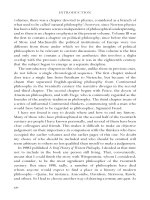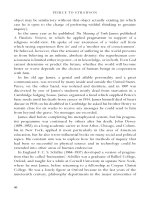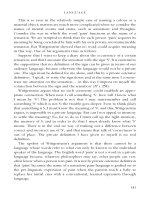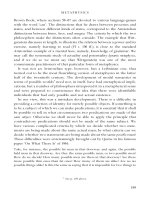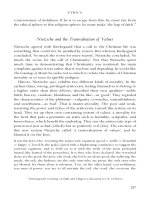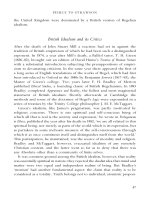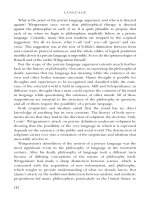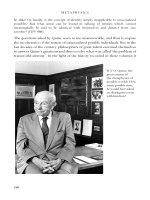Philosophy in the modern world a new history of western philosophy, volume 4 (new history of western philosophy) ( PDFDrive ) (1) 309
Bạn đang xem bản rút gọn của tài liệu. Xem và tải ngay bản đầy đủ của tài liệu tại đây (17.53 KB, 1 trang )
GOD
humans become conscious of themselves as possessing reason, will, and
love. In religion, man contemplates his own latent nature, but as something apart from himself.
Religion is the disuniting of man from himself; he sets God before him as the
antithesis of himself. God is not what man is—man is not what God is. God is the
infinite, man the finite being; God is perfect, man imperfect; God eternal, man
temporal; God almighty, man weak; God holy, man sinful. God and man are
extremes: God is the absolutely positive, the sum of all realities; man the absolutely negative, comprehending all negations. (EC 33)
Feuerbach agrees with Hegel that religion represents an essential, but
imperfect, stage of human self-consciousness. But Hegel’s own philosophy, according to Feuerbach, is yet another form of alienation: it is the
last refuge of theology. By treating nature as posited by the Idea it offers
us only a disguised version of the Christian doctrine of creation. We must
set Hegel on his feet, and place philosophy on the solid ground of
materialism.
Like Hegel’s doctrine of alienation, Feuerbach’s criticism of religion and
idealism had a great influence on Marx and Engels. But Marx regarded not
religion but capitalism as the greatest form of alienation—it was money,
not God, that was the capitalist’s object of worship. Religion, said Marx, is
the opium of the people. By this he did not mean that religion was a pipedream (though he believed that it was) but that belief in a happier afterlife
was a necessary stupefacient to make labour under capitalism bearable.
‘Religious suffering is at one and the same time the expression of real
suffering and a protest against real suffering. Religion is the sigh of the
oppressed creature, the heart of a heartless world and the soul of soulless
conditions. It is the opium of the people’ (EW 257).
While Hegel and Schopenhauer regarded traditional religious beliefs as
popular allegorical or mythical presentations of philosophical truths that
were accessible only to an enlightened elite, and while Feuerbach and Marx
regarded them as the illusory projections of alienated consciousness,
Kierkegaard always placed faith at the summit of human progress, and
regarded the religious sphere as superior to the regions of science and
politics. Ethics, too, he taught, must be strictly subordinated to worship.
For centuries, ever since Plato’s Euthyphro, philosophers had debated
the relationship between religion and morality. Does the moral value of
292
